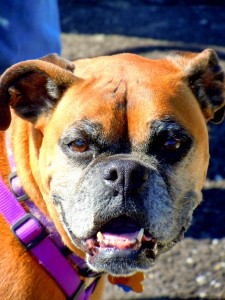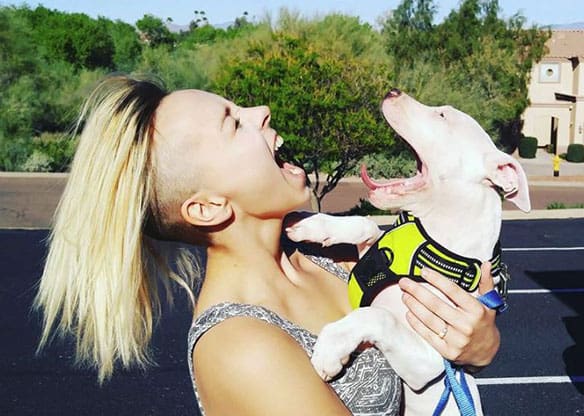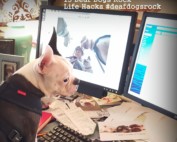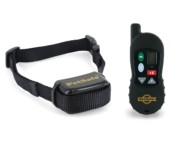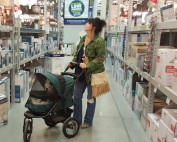Note from DDR: I know we talk about a lot about deaf dogs who are born deaf here at Deaf Dogs Rock but we don’t get into some of the specifics of our hearing senior dogs going deaf as they age. I think it is so important to use hand signals with vocal signals when you are training your hearing dog. Some hearing dogs can lose their hearing when they age and others can loose their hearing from an infection or a virus. Since my deaf dog Nitro is a boxer, I do keep track of some of the health issues in the boxer community. I thought this was a great article written for the Senior Boxer about Problems of Aging by Karla Spitzer. This article could apply to all breeds and aging.
Problems in Aging – by Karla Spitzer www.netplaces.com
While a few boxer lines go gray earlier, six years of age seems to be a common time for most lines of boxers to start to go grow gray hairs around the face and muzzle. At first, that is the primary area where they will turn gray, but eventually, gray hair will begin to appear throughout the entire body, and the fawn or brindle color that they used to be will simply start to fade. As early as age six, your boxer will also begin to lose muscle mass.
Hearing Loss
This may happen gradually, but many older boxers start to lose hearing around age ten or so. Brindles seem to lose their hearing more commonly than fawns. Once this starts to happen, it is essential to keep your boxer on-leash almost all the time. He will not be able to hear you when you call, and he could become endangered if he goes onto a street. If he doesn’t hear you, he probably also won’t hear a car approaching. Loss of hearing may account for not coming on recall when you call him as well.
Be aware that becoming hard of hearing might be very frightening or disorienting to your boxer. He may startle more and might be aggressive if awakened abruptly. He may respond aggressively if startled. If your boxer appears to be losing his hearing, make sure that your actions are calm and methodical to avoid startling or frightening him.
Hearing loss can be confusing. Sometimes, it is as if the hearing comes and goes a bit, and sometimes, the older, more opinionated boxer will exhibit a bit of selective hearing! It is important to watch this carefully. If you see a sign of hearing becoming a problem, make sure that your boxer is safely on-leash in situations that could be potentially dangerous to a hard-of-hearing dog. This might be a good time, if you have not taught your boxer signals before this, to teach him hand signals for a recall, down, and stay. Signals might be a lifesaver.
Confusion
There may be times when your boxer seems confused. Part of this might be a loss of cognitive function. However, it is just as likely that if your boxer’s hearing is going, he is confused about that. Since he is a dog, he doesn’t understand what is happening, and this may cause a less confident demeanor and hesitation in approaching you and other people, attitudes that were never an issue earlier in his life.
However, if your boxer is losing his cognitive faculties, you may find that he is going outside, and just standing there, unsure of what to do next. He may begin to hide. He may hear you calling him, but he may forget what that means and not come for that reason. He may walk around in patterns or without a real destination. He may forget where his food or water bowls are, or he may not recognize familiar people.
If your boxer is suffering from cognitive dysfunction of aging, he might become fearful of ordinary things in life that never bothered him before, such as furniture, heaters, thunder, passing traffic, other loud noises, and strangers. He could react aggressively if he becomes too fearful.
Potty Accidents
Possibly the most distressing problem of aging to both you and to your boxer are housetraining accidents that have not been issues since he was a little pup. As dogs age, like humans, the frequency of the need to urinate can increase greatly. Without greater access to outside areas where he can potty, your boxer may find it necessary to urinate in the house. This will distress him if he isn’t suffering from cognitive dysfunctions that can be associated with aging. It is very important to make sure that your boxer can get outside or that his walks increase accordingly.
It is also possible that your boxer will have accidents and defecate in the house. While that may be the result of having to potty more frequently or problems with his sphincter muscles, defecating in the house tends to relate more to cognitive dysfunction.
At any rate, if you see potty accidents occurring in the house, you need to make sure that he has a chance to potty outside more frequently.
Failing to Respond to Social Stimuli
Whereas before your return home after work was the most exciting event in your boxer’s day, now he might approach you slowly and almost fearfully, possibly cringing or cowering before it seems to dawn on him that his beloved person is home. Only then does his happiness reveal itself. This may go even further in that your boxer no longer tolerates being petted for periods of time or even much human contact at all. If your boxer is at this point, then you are truly dealing with a geriatric patient (regardless of chronological age), and you must decide what steps to take to safeguard him in this condition.
Old age problems that require immediate veterinary attention include your boxer whimpering when he moves, convulsions or seizures, drinking massive amounts of water (and urinating accordingly), more frequent vomiting, and refusal of food.
This is not a great time to make big changes in your or your boxer’s life. Some boxers that change households after age seven or so seem to mourn lost yards or surroundings. They seem to take change in their routines and surroundings (territory) very seriously. If your boxer has begun to avoid social stimuli, you need to evaluate big changes carefully with his needs in mind. Since his days are probably numbered, you may want to put off big moves, house remodels, or changes in household members or routines.
If your boxer is at this stage, it is also unwise to consider bringing in a new pup. If your boxer is still alive when the pup becomes a juvenile, the pup’s protective pack instincts could kick in and cause him or her to try to drive your boxer out of the pack, as canines in the wild would do. Driving the old and infirm and the weak out of the pack is a protective measure so that the pack will not be slowed down or made vulnerable because of the illness or infirmity of one of its members, making the entire group an easier target for predators or competitors for control of the territory.

